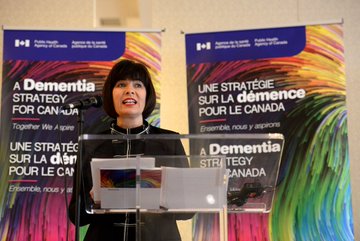
Canada’s Minister of Health announced the release of the first national dementia strategy on Monday. It focuses on prevention, advancing therapies and finding a cure, as well as improving the quality of life for people with dementia and their caregivers.
According to official statistics, more than 419,000 Canadians aged 65 and over are diagnosed with dementia, two thirds of whom are women. After the age of 65, the risk of being diagnosed with dementia doubles every five years in Canada.
Dementia is a condition that affects a person’s brain by altering his or her cognitive abilities such as memory, awareness of a person, place, time or language. It is a progressive condition that, over time, can reduce the ability to independently maintain activities of daily life. In Canada, seniors with dementia rely on family and friends for an average of 26 hours a week.
A strategy mainly focusing on prevention
Mental decline can have many different causes but there are few treatments and those that exist don’t do much but slow dementia’s progression.
Prevention is a key priority in the $50 million strategy, with the government hoping that if Canadians get more exercise, eat better and don’t smoke, they’ll avoid dementia causes such as strokes.
In its strategy, the federal government has set out three national objectives:
- Prevent dementia
- Advance therapies and find a cure
- Improve the quality of life of people living with dementia and caregivers
The $50 million will be spread over five years to support the implementation of the Strategy through actions in four key areas: awareness, treatment guidelines, early diagnosis and surveillance.





